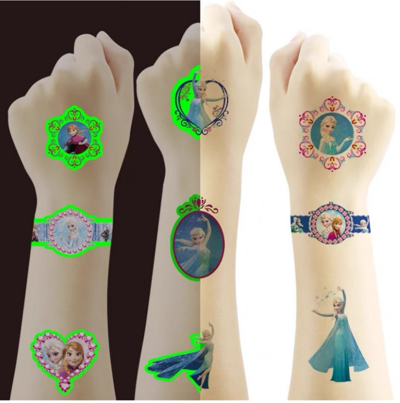From Traditional Parlors to the Vending Machine Tattoo: The Evolution of Tattoo Culture
The evolution of tattoo culture has been a fascinating journey, marked by significant shifts in societal attitudes, technological advancements, and artistic innovation. From traditional parlors to vending machine tattoos, this evolution reflects changes in perception, accessibility, artistic innovation and the very nature of tattooing itself.
The oldest tattoo known to mankind dates to around 3300 BC and was found on the body of Otzi the Iceman, who was discovered in the Alps between Austria and Italy in 1991. Since Otzi the Iceman, there have been countless civilisation’s and cultures who have used tattoos and tattooing for any number of reasons.
History & Revolution of Tattoos Culture
Historically, tattoos were often associated with specific cultures and rites of passage. Traditional tattoo parlors emerged as places where skilled artists used manual techniques to create intricate designs. The process involved needles attached to wooden handles, and ink was manually applied to the skin. Bamboo tattooing was a popular technique amongst many cultures from South East Asia to the Pacific Islands and the Africa’s.
The introduction of tattoo machines revolutionized the tattooing industry. Thomas Edison's electric pen, patented in 1876, served as a precursor to the modern tattoo machine. This innovation allowed artists to work more efficiently, contributing to the growth of the tattoo culture. As societal attitudes towards tattoos evolved and moved away from negative stereotypes, tattooing became more mainstream. It transitioned from a symbol of rebellion to a form of self-expression and personal storytelling.
More recently, due to advancements in ink formulations and tattooing techniques, the range of possibilities for artists and clients has expanded. Watercolor tattoos, white ink tattoos, and intricate shading techniques became popular, showcasing the versatility of tattoo art, becoming more and more popular. The visibility of tattoos on celebrities further propelled the mainstream acceptance of body art. Many celebrities openly displayed their tattoos, contributing to the normalization of tattoo culture.
Additionally, tattoo culture shifted towards greater customization and personalization. Clients sought unique designs that held personal meaning, and artists increasingly became collaborators in bringing these visions to life. Tattoos became intertwined with pop culture, influenced by fashion, music, and art trends. Styles such as tribal, Japanese, and realism gained popularity at different times, reflecting the dynamic nature of tattoo culture.
The advent of the internet made it easier for people to explore tattoo designs, find artists, and share their own experiences. This accessibility led to a diversification of styles and influences within the tattoo community.
Concurrently while the permanent tattoo market was developing and expanding, the temporary tattoo market followed suit throughout the 20th and 21st century. It is generally agreed that the first temporary tattoos came in the Cracker Jack (Trademark) boxes in 1912 and featured a prize in every box. As technological and mechanical advancements occurred it was a natural progression for temporary tattoos to move over to a vending format to compliment the current over the counter and mail order purchasing model.
The mechanical tattoo vending machine was invented in the late 20th century and started appearing globally at the turn of the 21st century and this market has been growing ever since. The latest development in the temporary tattoo market was the invention of the cash and cashless electronic tattoo vending machine that can be adapted for any country or region. The founder of the Tattoo Vending Shop Damian Lewis, invented and developed and market tested this concept and machine in Australia for over 2 years before releasing it to the international market.
The demand for this new innovative tattoo vending machine by the Tattoo Vending Shop has been overwhelming. Currently the Tattoo Vending Shop is the fastest growing temporary tattoo vending business in the world, as it has the only product of its kind. Recent market feedback has indicated that a number of copycat machines are currently being developed by a range of vending operations globally. With a 12-month lead on any possible competition and knowing that the machine originally produced by German engineers and Australian manufacturers is the best in the world, the Tattoo Vending Shop has a dominant market leading position in the electronic tap tattoo vending machine market.
The future of tattoo culture may involve further integration of technology, such as augmented reality tattoos or biometric tattoos that interact with the body. Additionally, sustainability and eco-friendly practices are becoming more important in the tattoo industry. Furthermore, the temporary tattoo market is valued at approximately $1 billion (US) per annum and is forecasted to grow at a rate of 10% per annum for the coming 5 years. An exciting burgeoning industry that is still in the growth phase of the product life cycle.
To Summarize
In summary, the evolution of tattoo culture reflects broader societal changes, technological advancements, and a growing appreciation for the art form. From traditional manual techniques to high-tech vending machines, tattoo culture continues to adapt and thrive in response to the ever-changing dynamics of the modern world.
The Tattoo Vending Shop electronic temporary tattoo vending machine is a global leader in the temporary tattoo vending field with its invention and sale of the world's first tap and go, QR reader, AliPay, WiPay, Apple Pay, cash and coin temporary tattoo vending machines. Being innovative market leaders, it is expected that they will continue to lead and dominate this market and continue to bring cutting edge technology and best practice to the temporary tattoo industry.



